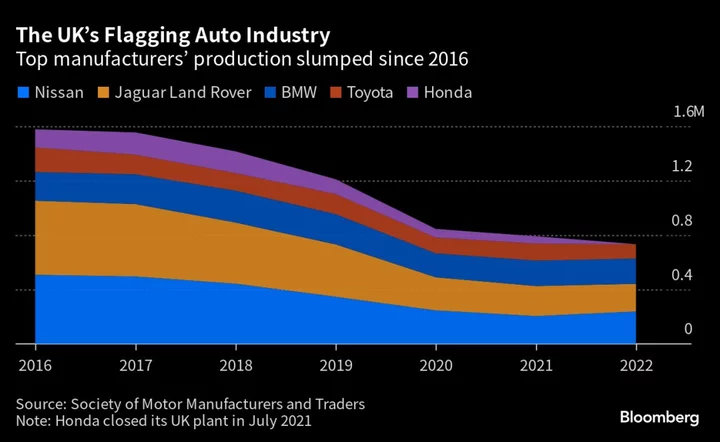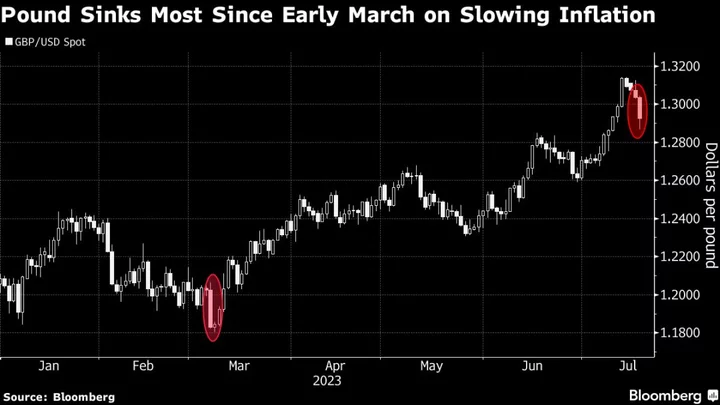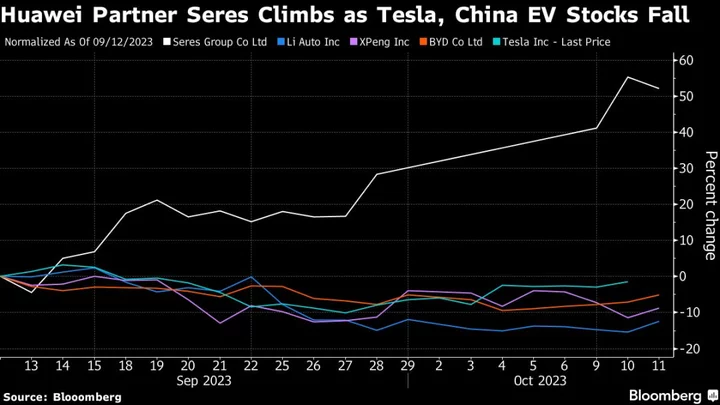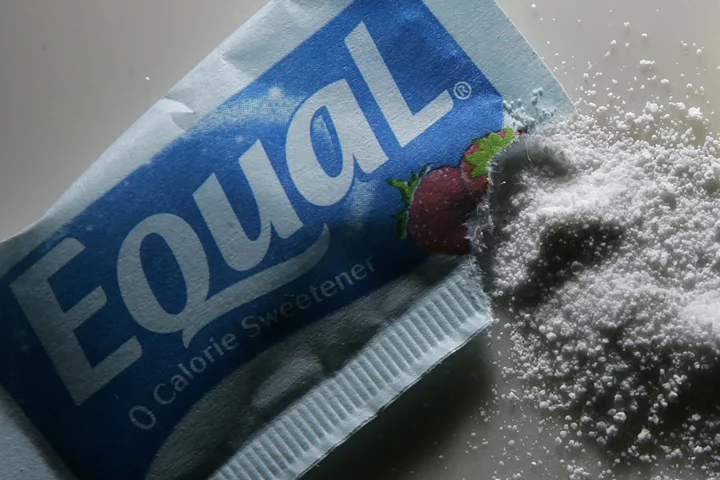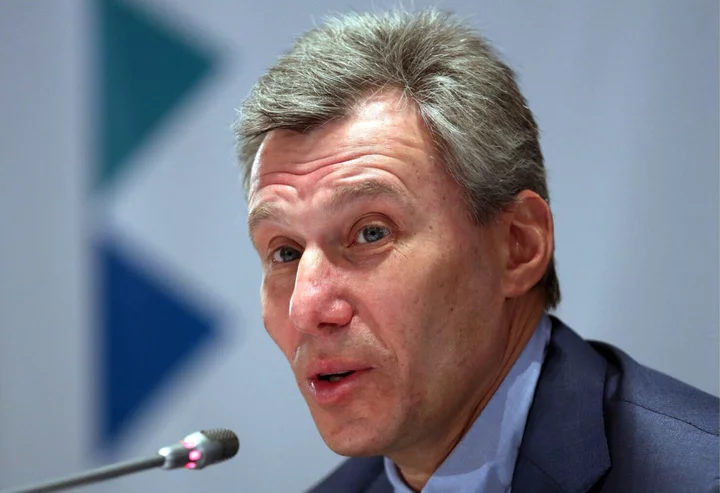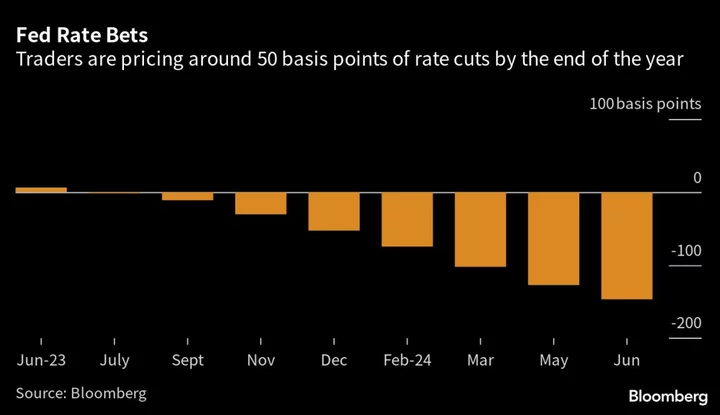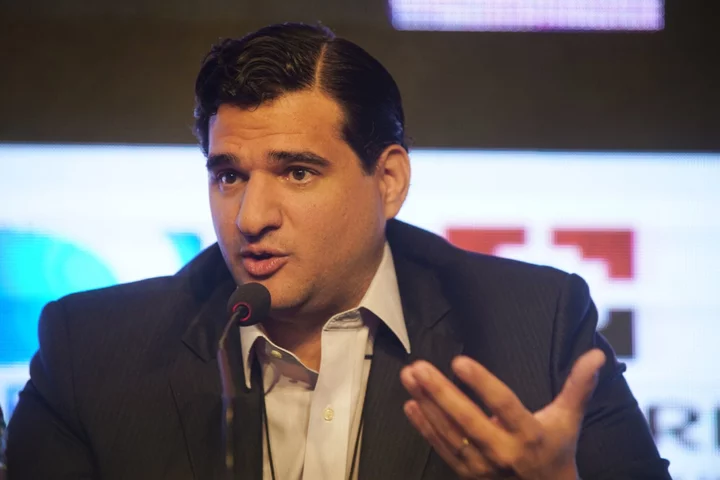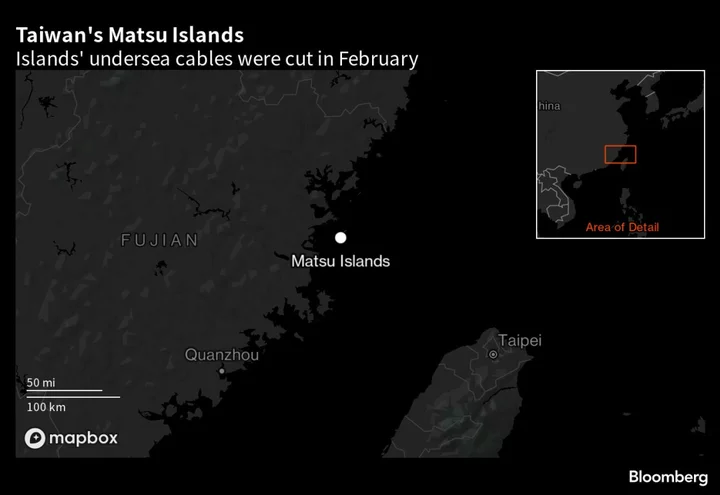Britain’s car industry has been on the decline for some time. Last year, production fell to a 66-year low due to the closing of two plants, a global shortage of semiconductors and supply chain bottlenecks.
It has also faced an existential challenge as rival governments pledge vast amounts of public funds to the development of electric vehicles.
“The reality is that the global battery market is not a free market,” said Andy Palmer, the former chief executive officer of Aston Martin who now chairs Slovak battery maker InoBat. “It is distorted by huge state subsidies and we either recognize that and respond, or see our auto industry slowly deplete.”
On Wednesday, however, the outlook brightened. Prime Minister Rishi Sunak flew by helicopter to Warwickshire, in the west Midlands, to hail a new range of electric Jaguar Land Rover vehicles that will be backed by a £4 billion ($5.2 billion) battery factory to be built further south in Somerset.
The UK came close to missing out on the new battery plant, with executives at parent company Tata Group considering Spain as an alternative location. Nine months ago, in the wake of Liz Truss’s resignation, financial markets were still reeling from her disastrous mini-Budget and the country had just welcomed its third prime minister in two months. Grant Shapps, who was Business Secretary at the time, received a call from Tata executives to say they wouldn’t be choosing Britain for the plant.
That phone call triggered a series of conversations between UK ministers, officials and senior representatives from Tata including its Chairman Natarajan Chandrasekaran, according to people familiar with the discussions. In March, Shapps flew to Mumbai, India for a crunch meeting with Chandrasekaran.
At that point, UK officials were still concerned Spain would win out and the authorities in Madrid were confident they’d clinched the investment, Bloomberg reported at the time. Shapps described Tata’s decision as being on “a knife edge.”
After Shapps’s return, his successor — Kemi Badenoch — sent Chandrasekaran a text message which began months of correspondence between the two over the shape of a possible deal. By May, the wheels were in motion. Investment Minister Dominic Johnson met Tata executives while on an unrelated trip to India and returned with something close to a final settlement. The deal was finalized after Tata’s Chief Procurement Officer Tom Flack visited Number 10 Downing Street to meet Badenoch and Shapps.
Numbers Game
Electric vehicle manufacturing requires large scale plants to provide millions of batteries. America is offering state support for clean technologies such as electric vehicles — and the batteries needed to power them — as part of President Joe Biden’s Inflation Reduction Act. The European Union, meanwhile, has proposed a relaxation of state aid rules when it comes to green technology.
Read More: Biden’s Green Subsidies Risk Speeding UK Car Industry’s Decline
Neither the UK government nor Tata Group said how much public money was being put into the battery plant in Somerset. The package is likely to exceed more than £500 million, according to two people familiar with the situation.
Mike Hawes, chief executive of the Society of Motor Manufacturers and Traders, told Bloomberg Radio that other countries and political blocs had been “incredibly generous” in what they were offering. However, he said the announcement from Tata “demonstrated the UK can win on the international stage.” It was “turning around some of those perceptions that have been around the UK for the past seven or eight years,” he said.
The UK needs more battery factories, like Tata’s, if its automotive sector is to thrive. Plans for a large plant in the northeast of England faced a setback earlier this year when Britishvolt Ltd. collapsed.
Elsewhere in the region, £100 million of public funds have been put toward an electric car hub under construction near Sunderland, which is being primarily financed by Nissan and Japanese battery maker Envision AESC. That site, which will employ 1,000 people and begin operating in 2025, will make batteries for Nissan’s latest generation of vehicles.
Much larger plants are required, however. “We’re always in dialog with lots of different companies around the world on ways that they can invest in the UK,” Sunak said during Wednesday’s visit to Warwickshire.
Johnson, the Investment Secretary, told Bloomberg Radio on Wednesday that Tata’s commitment “really will have a domino effect” and attract other businesses. He said that when Tesla decided to build a battery factory in Germany in 2019, with Elon Musk citing Brexit as a disadvantage for the UK, ministers “decided we weren’t going to let that happen again.”
Brexit
Efforts to recharge Britain’s car industry are complicated by its relationship with the EU after Brexit. The EU is the largest single destination for cars manufactured in the UK, accounting for 58% of the domestic industry’s exports in 2022.
However, as of next year, at least 45% of the value of an electric vehicle must be sourced in the UK or the EU if it is to be sold on the other side of the Channel without a 10% export tariff under new rules of origin requirements. From 2027, the threshold will rise to 65%. UK officials have not yet persuaded Brussels to delay the deadline.
Touring the JLR plant on Wednesday, Sunak said negotiations are still taking place with the EU.
“It’s not just affecting UK manufacturers, it’s important to remember that that also affects European manufacturers as well,” he said, adding that companies across the continent are lobbying on the issue.
JLR and Tata will be the anchor customers for the site in Somerset, which will be capable of providing 40 gigawatt hours worth of batteries with supplies starting from 2026. The gigafactory could supply roughly half a million vehicles a year and will be one of the largest in Europe. It will create 4,000 jobs and more in the wider supply chain.
Not all industry experts are enthused, however. Former Aston boss Palmer says the UK is still playing catch-up. “We need more,” he said. “And there is a risk that because of a lack of urgency to build gigafactories to date, this Tata plant is too little too late.”
--With assistance from Caroline Hepker, Anna Edwards and Siddharth Philip.
Author: Jamie Nimmo, Sabah Meddings, Ellen Milligan and James Woolcock

